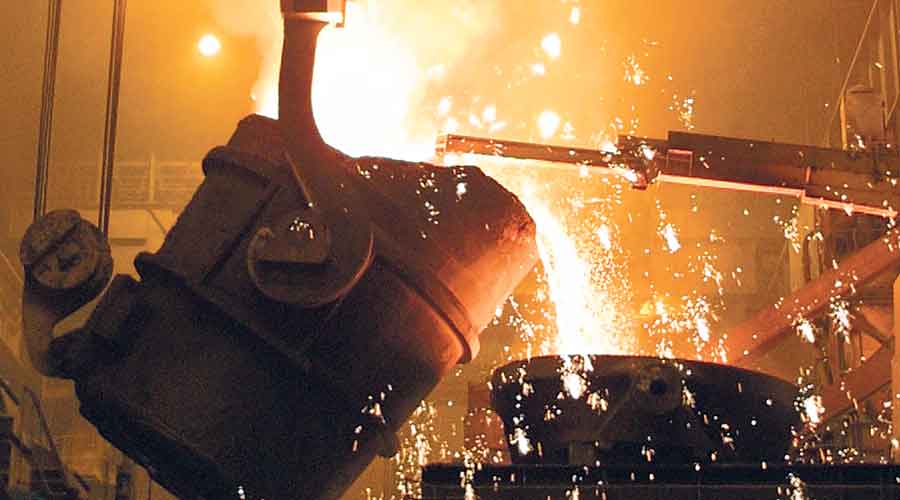Indian steel giants are improving their balance sheets by reducing debt, making the most of the unprecedented rise in prices and higher margins.
Steel Authority of India Ltd shaved off gross debt by Rs 16,150 crore in 2020-21, making it the second steel company after Tata Steel Ltd to carry out such an aggressive deleveraging of the balance sheet.
In a year pockmarked by the Covid pandemic and lockdown-induced demand destruction during the first quarter, the steel players prioritised debt reduction over capital expenditure.
SAIL’s gross debt, which typically excludes the cash and cash equivalents of a company would have, came down to Rs 35,330 crore at the end of 2020-21 compared with Rs 51,481 crore at the end of 2019-20.
In comparison, Tata Steel brought down its gross debt by Rs 7,649 crore in the first nine months of the last fiscal. The company guided to chop off the block another Rs 12,000 crore in the last quarter alone.
Net debt for Tata Steel came down by Rs 18,609 crore during the nine months, backed by strong cash generation from the second quarter onwards. The company went slow on the expansion at Kalinganagar during this period, allocating only Rs 1,394 crore. It restarted work on the pellet plant and cold rolling mill complex from January .
Jindal Steel & Power Ltd, a company promoted and managed by Naveen Jindal, also fast-tracked its payments to its creditors. A company, which was in the throes of a crushing debt burden, brought down the net debt by Rs 10,298 crore in nine months, partly also by asset sale.
JSW Steel, promoted and managed by Naveen’s elder brother Sajjan Jindal, could only bring down the net debt by Rs 1,680 crore in nine months. However, it may be the only large integrated player whose debt level would go up by fiscal-end.
Driven by entrepreneurial instinct, Sajjan Jindal neither soft paddled on expansion nor shied away from big-bulge acquisitions.
JSW Steel completed the Rs 19,750-crore acquisition of Bhushan Power & Steel Ltd in the last week of March, commissioned a fresh 5-million-tonne expansion at Dolvi, Maharashtra and bought two downstream companies and assets — Asian Color Coated Ispat Ltd and the plate and coil business of Welspun Corp Ltd respectively.
Surprise on the upside
The debt reduction exercise undertaken by the frontline integrated steel producers appears to have topped the estimates of the analysts. Crisil, for instance, had guided a cut of Rs 25,000-crore debt in this fiscal and another Rs 10,000 crore in the next fiscal.
Domestic hot-rolled coil prices, which touched Rs 56,000 per tonne in March, rallying from Rs 39,200 a tonne in March 2020, have started moving northwards again from April, taking cue from the 10 per cent discount that exists with the international prices.
Icra expects that the recent spurt in Covid cases may moderate domestic demand but steel players are said to be diverting their production to the international market to take advantage of the buoyant prices.
An analysis by the rating agency pointed towards the firepower of the steel majors that laid siege on the debt mountain. It suggested that the operating margins of 21 companies accounting for 60 per cent of the domestic steel capacity rose sharply quarter-on-quarter to 30.1 per cent in Q3 of 2020-21 from 21.3 per cent in Q2 (14.6 per cent in Q3, 2019-20) due to a steep hike in steel prices and higher sales volumes.
Crisil expects that cash accruals of the top five players could surge over 40 per cent year-on-year to Rs 40,000 crore in this fiscal and another 10 per cent in the next fiscal.
Icra expects the operating profitability of the industry in Q4 FY21 to improve further to around 32.4 per cent.











